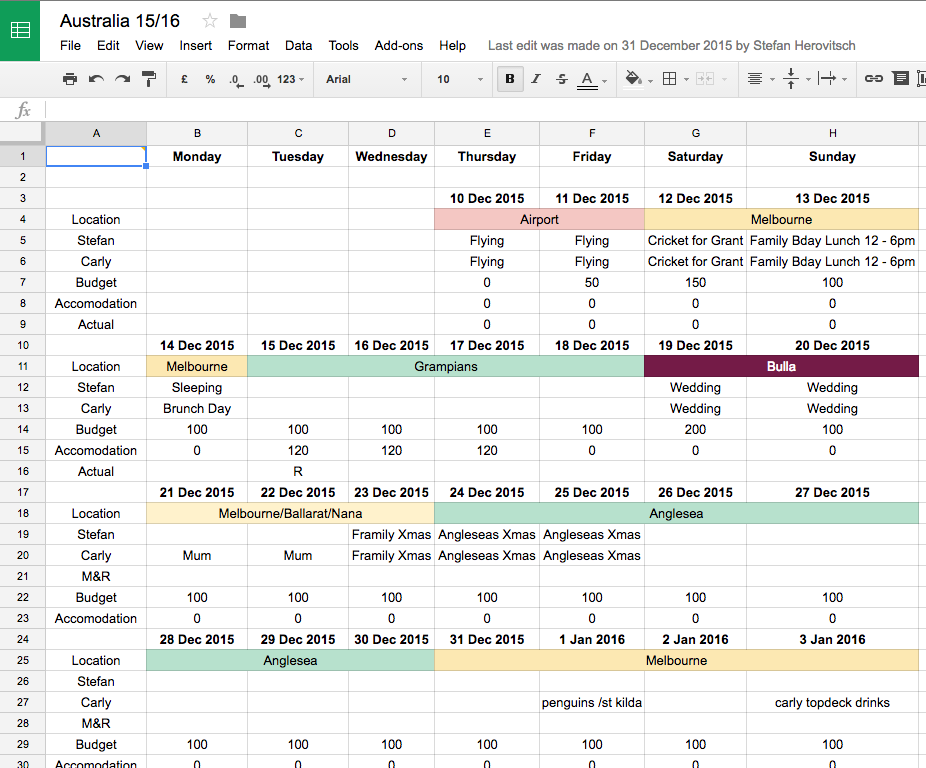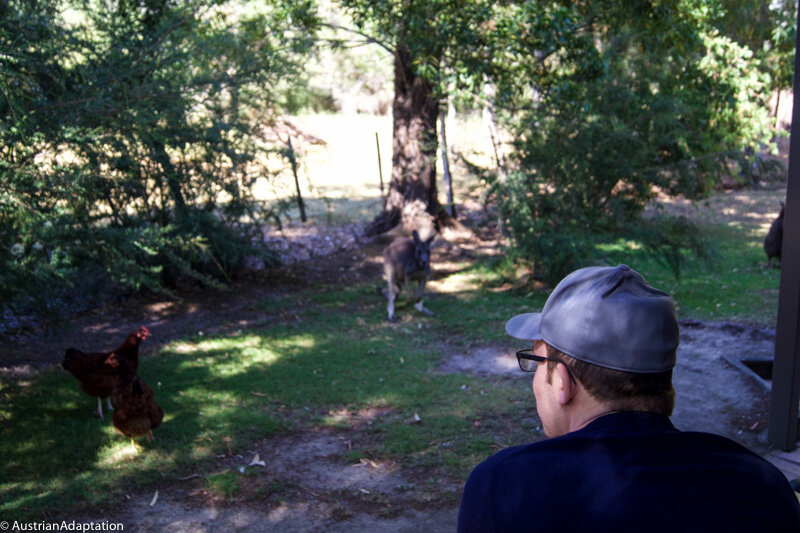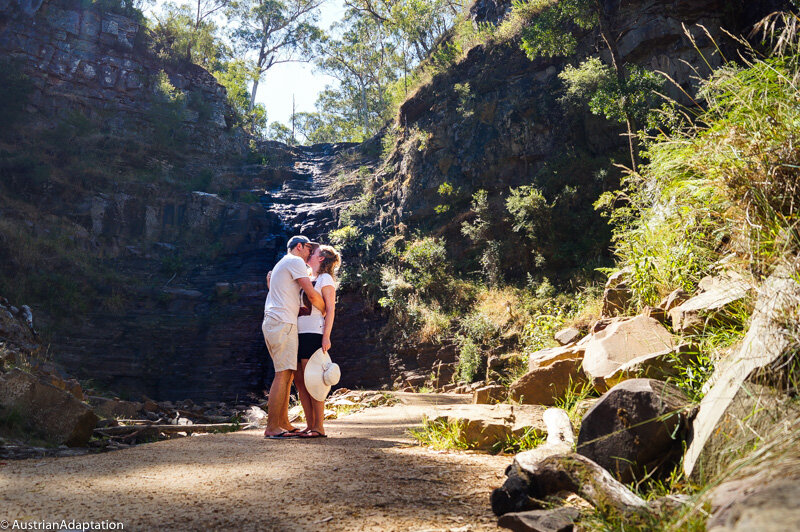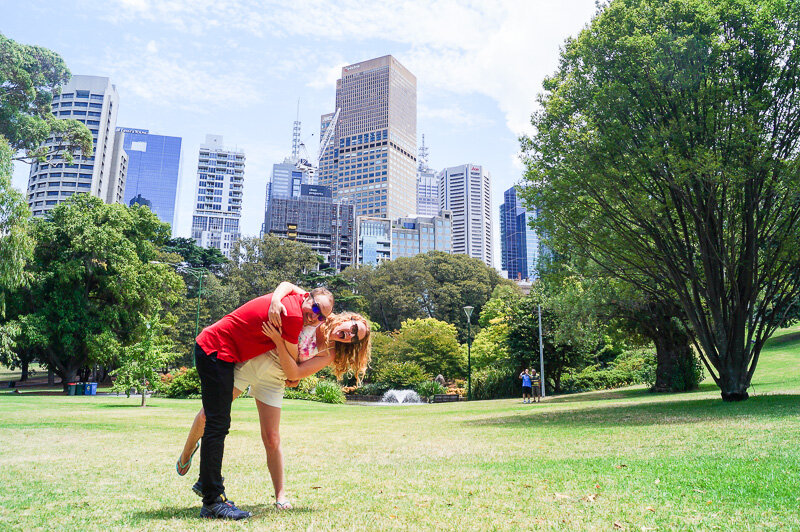How to Plan for the Expat Trip Home
I hate to admit it, but I think the spreadsheet saved us.Planning a holiday with a spreadsheet is, for me, the opposite of fun. A small piece of my soul crawled up my throat and died when Stefan first suggested it. To be fair, he had good reason.
The Backstory
On our first trip to Australia in 2012, 3 weeks of 'catching up' with friends and family were so chaotic that we nearly missed out on the quintessential Australian experience. During the final few days of the trip, Stefan casually mentioned that we hadn't seen a Kangaroo or Koala, let alone the much more exciting Platypus or snakes. In all the excitement of seeing my old friends, revealing our marriage for a Visa and celebrating Christmas, we'd left off the real Australian activities.Panicked and determined to redeem myself as a host, we frantically rose at 7am the next day. Determination in our eyes and sensible walking shoes slapped on our feet. We sweated through a 2-hour early morning drive to Healseville Sanctuary, hoping the Australian wildlife would be awake and worth the stress. Whipping around the Zoo in 40 degree heat, snapping photographs like a madman, the 'connection to nature' dream experience morphed into a 'shit let's get this done' frenzy. I was *perhaps* a little too determined for him to experience more than just our overpriced beer and sunburn.It was not the leisurely tourist experience that ad campaigns are made of. For this summers trip home, we weren't taking any chances of a repeat performance.
For this summers trip home, we weren't taking any chances of a repeat performance.
This time around
There was a spreadsheet. It was colour coded, budgeted in multiple currencies, broken down by family member, place and activity. It was epic. It was everything my gypsy-travellers spirit shuddered against. It may also have been the best possible way to maximise our time spent with family, friends and enjoying an actual holiday.In the 3 week trip back over the Australian summer, we managed to squeeze in a wedding weekend, a getaway to the Grampians, a week at the beach, visits to my Nana (which now, 6 months later I am so very grateful for), catch ups with the core crew, dinner dates galore and, of course a LOT of brunch.
It may also have been the best possible way to maximise our time spent with family, friends and enjoying an actual holiday.In the 3 week trip back over the Australian summer, we managed to squeeze in a wedding weekend, a getaway to the Grampians, a week at the beach, visits to my Nana (which now, 6 months later I am so very grateful for), catch ups with the core crew, dinner dates galore and, of course a LOT of brunch. We nailed the Australian experiences in the first week - spotting Emus, Kangaroos, Cockatoos and Wallabies in the wild. Not that it's all about ticking the boxes, but if it was, we won :)
We nailed the Australian experiences in the first week - spotting Emus, Kangaroos, Cockatoos and Wallabies in the wild. Not that it's all about ticking the boxes, but if it was, we won :) So going home was....actually relaxing. The stress about telling people where home really was melted away. Knowing we had a certain amount of days to spend with everyone, plus time to ourselves to explore, made the trip an actual holiday. Not just the dutiful annual journey to keep up cross-continental relations.I'm not saying it was sunshine and rainbows the whole time - the first week back among family and friends is always hectic, occasionally stressful and a sensory emotional overload. But planning really really helped reduce the impact for us.So despite my irrational hatred of spreadsheets - here's my top tips of how to plan for the classic Expat Trip Home.
So going home was....actually relaxing. The stress about telling people where home really was melted away. Knowing we had a certain amount of days to spend with everyone, plus time to ourselves to explore, made the trip an actual holiday. Not just the dutiful annual journey to keep up cross-continental relations.I'm not saying it was sunshine and rainbows the whole time - the first week back among family and friends is always hectic, occasionally stressful and a sensory emotional overload. But planning really really helped reduce the impact for us.So despite my irrational hatred of spreadsheets - here's my top tips of how to plan for the classic Expat Trip Home.
Give yourself a break.
The best thing we did on this trip was schedule a 4 day getaway, just the two of us, early in the trip. The entire thing was based on what Stefan wanted to see most (inexplicably to me, the thought of a long, flat, dry and dusty road fascinated him the most. I suppose they don't exist in Tirol?). We timed it within the first week - giving the family enough time to see us and get over all of our first excitement, so by the time we were back from our 4 day getaway, everyone could relax and enjoy each others company.
Budget to take back control.
In 2012 the Aussie dollar was strong and we were massively unprepared for the huge costs of visiting Australia. $8 for a beer, $50 on brunch, $10 to ride the tram. It felt like money out the window. Although the exchange rate was in our favour this time around, what gave back our feeling of control was knowing our limits. Having a daily budget meant we were prepared in advance, and knew when we could have a big night out. Or, as happened on New Years Day, we knew we had cash to spare to book a hotel when other plans fell through. It was a huge relief to not come back from a holiday massively in debt. It also does wonders for the begrudging effect of 'But I spent all my money going back to bloody Australia'.
Set Boundaries.
This is a classic returning expat mistake. Because you have made the effort to visit home you run around like a mad chook trying to see as many friends as possible in as short a time as possible. Repeat after me - IT'S. NOT. POSSIBLE. You need to communicate clearly to your friends where you will be, when and likewise make it clear when you are not available. If you have taken the trouble to fly 40,000 kilometers to the other side of the planet in a tin can for 36 hours, they can get off their arse and meet you in a bar on the other side of town. If you try to please everyone by meeting them everywhere you will be exhausted. Set boundaries (in a spreadsheet if you must) and stick to them.
Do Nothing.
The best conversations with your mum & dad, the funniest moments with your friends and the small joys you rediscover in your own home town will happen when you least expect it. Spreadsheeting a rough plan per day is fine - but don't schedule it down to the minute. Give your days time to breathe and move a little. That stroll down to the shops might just be the best chat you have with your parents all trip - and if you'd scheduled a dinner, it might not have happened. Make a plan, but give yourself room to move around it if need be.
You will get sick/tired/sunburnt/exhausted.
Every damn time we are home there is a 'crash' period that both Stefan and I suffer through at different points. I'm normally fine for the first week after the flight, powering through on adrenaline and a hearty Australian disregard for jetlag. Stefan suffers and needs sleep for the first 3 days, hydrating and taking care of his poor skin that cannot handle the Australian climate. My crash comes after the first week, once I have seen and done the most important things, I collapse for 2 days, in a stupor of exhaustion. I'm like a puppy that's tuckered itself out running around too much. Embrace your crash period, be kind to your body and revel in the superior Netflix choices of your home country.They were our survival tactics, do you swear by any others? If you have more tips please add them in the comments, I'd love to hear about them!